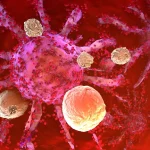A definition of immunotherapy in oncology
Immunotherapy is essentially a treatment that allows the body’s cells to more effectively fight off cancer cells.
Because cancer calls sometimes manage to trick the immune system’s cells, immunotherapy interventions seek to either boost the immune system or reprogram it to flush out and destroy cancer cells.
Immunotherapy goals
The goals of immunotherapy are to:
- provoke an immune reaction that targets cancer cells without harming healthy tissue;
- generate an immunological memory that will prevent remaining tumor cells, i.e., cells that were not destroyed during the first treatment, from further developing;
- prevent metastasis.
Immunotherapy can be specific or non-specific, active or passive
- Specific immunotherapy
The goal of specific immunotherapy is to achieve an increasingly targeted response through the use of antibodies specific for the tumor antigen that make it possible to generate an active or passive immunity.
- Non-specific immunotherapy
As alluded to by its name, non-specific immunotherapy acts on the entire immune system rather than solely targeting cancer cells. It is hoped that this will allow for efficiently attacking abnormal cells. The oldest form of immunotherapy, non-specific immunotherapy relies, among other things, on a family of molecules produced by the human body, the cytokines[i] (substances involved in cell-to-cell communication). These molecules, which play a key role in the immune response, can be manufactured in a laboratory and be used to treat certain types of cancer.
- Active immunotherapy
Active immunotherapy directly stimulates the immune system to provoke a specific immune response to cancer. Examples of this include therapeutic vaccination and new specific immunotherapies such as checkpoint inhibitor therapy and CAR T-cell therapy.
- Passive immunotherapy
Passive immunotherapy rests on the principle of reinforcing the existing immune response through the use of laboratory-produced substances to mimic several aspects of the immune system and attack specific cells. For example, cytokines and monoclonal antibodies manufactured in a laboratory setting are often used in passive immunotherapy treatments.
[i] Substances involved in cell-to-cell communication.

































